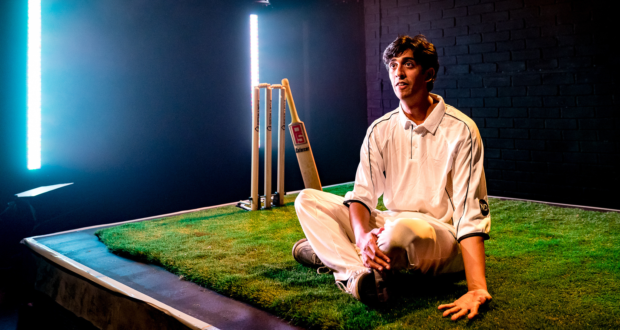Far from failing to score, Duck entertainingly explores the world of cricket and national identity through the eyes of a South Asian teenage batsman. Summary
Rating
Good
There isn’t a hugely obvious crossover between theatre and cricket. Harold Pinter was famously a fan. Samuel Beckett was a decent left-handed batsman and seam bowler by all accounts. There aren’t, however, many serious plays about the sport. I can see exactly why playwright Maatin (who apparently rocks a single name like Prince) wanted to give it a go.
Duck’s set, rather wonderfully, is an actual wicket. There’s a set of stumps and a red ball placed ominously centre stage. It’s a welcome, imaginative use of the Jermyn Street theatre space by an uncredited set designer. There’s also a scoreboard. This is set to 07.07.05 by actor Gavi Singh Chera as he begins to tell his tale; the relevance of which we learn later.
Chera is playing teenager Ismail, known as Smiley to his lazy English friends. It is an utterly charming solo performance and the laughs, when they come, come easily. Impressively nimble on his feet, he, and movement director Phoebe Hyder, deserve credit for many of the play’s best moments. From credible cricket action to adorable teenage dancing, this is a physically assured performance. If we don’t quite ever believe Ismail is fourteen, it’s because the character is written with adult articulate self-awareness. This is an older writer looking back. Music choices and the appearance of a bright blue bottle of WKD suggest looking back to the noughties.
The story focuses on Ismail’s time with his school’s ‘First Eleven’ cricket team. We’re immediately, unapologetically, amongst the privately educated. There’s nothing to say all theatre needs to be about class struggle but easily dropped references to privilege here jar in an otherwise outwardly political text. Whether this bothers you will depend on your background, of course, but this leftie reviewer saw a clear opportunity missed for richer analysis.
If class is skirted around, race sits front and centre. In a big moment, Ismail is arrested in the aftermath of London’s 7/7 bombings – the date his scoreboard foreshadowed. The shocking fact that an innocent teenage South Asian immediately becomes a suspect isn’t given much stage time though. The event simply fulfils a plot point about truancy. A later on-the-nose discussion of the ‘Tebbit Test’ is clearer in intent but perhaps clumsier in execution. Maatin concludes that being different is good. In doing so, they directly relate the complexities of being of South Asian origin in the UK to batting left-handed. Given that, in the real world, racism at Yorkshire Cricket club cost bowler Azeem Rafiq his career, this feels like an oversimplification that lets us all off the hook.
It is, however, very easy to forgive Duck for being politically naive. The skilful central performance, aided by strong direction, raises nothing but smiles and warm applause – just, in fact, like a sweet square cut to the boundary.
Written by: Maatin
Directed by: Imy Wyatt Corner
Lighting Design by: Catja Hamilton
Sound Design by: Kayode Gomez
Movement Direction by: Phoebe Hyder
Duck plays as part of Jermyn Street Theatre’s Footprints Festival until 18 July. Further information and bookings can be found here.
 Everything Theatre Reviews, interviews and news for theatre lovers, London and beyond
Everything Theatre Reviews, interviews and news for theatre lovers, London and beyond



